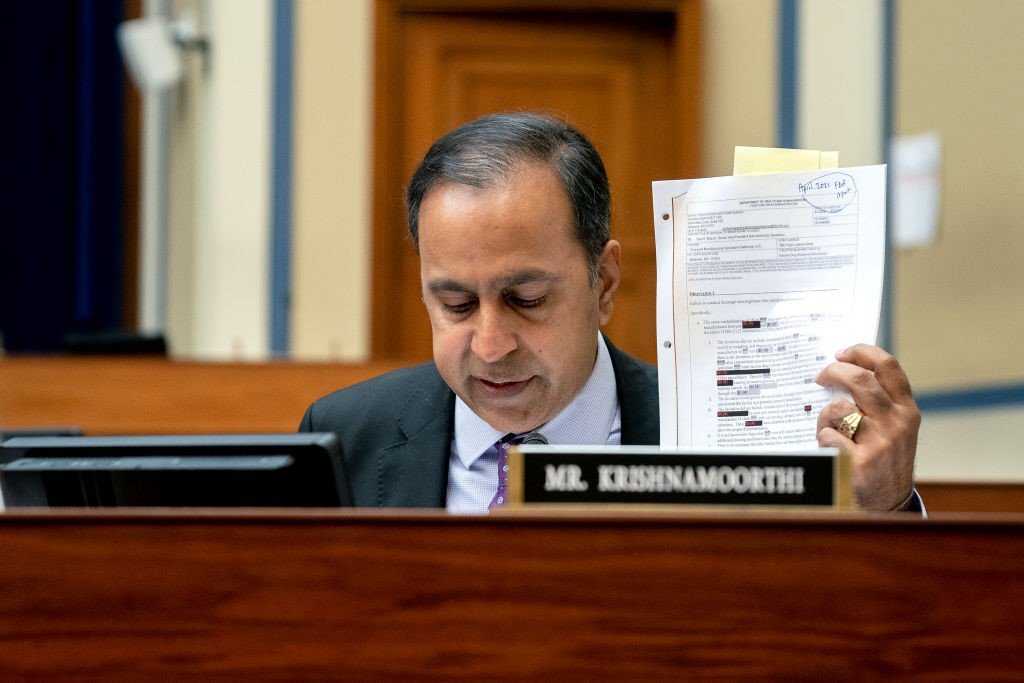
Rep. Krishnamoorthi Launches NOVID Act to Protect U.S. from Risk of New Coronavirus Strains
Indian AmericanRepresentative Raja Krishnamoorthi (D-IL) displays an FDA report during a House Select Subcommittee on the Coronavirus Crisis hearing in the Rayburn House Office Building on Capitol Hill in Washington on May 19, 2021 in Washington, DC. (Stefani Reynolds-Pool/Getty Images)
India-West Staff Reporter
Indian American Congressman Raja Krishnamoorthi May 19 announced that he is launching legislation to provide funding for vaccinating 60 percent of the population from middle-income countries against COVID-19, ANI reported.
The legislation will expand American aid to India, Argentina, and other nations to end COVID surges through vaccination, reducing the risk of dangerous new variants, according to a press release. Krishnamoorthi told ANI, “Today I am launching legislation to provide funding so that we can vaccinate 60 percent of the population in middle-income countries around the world. We need to vaccinate the rest of the world if we can do that. And we can finally get rid of COVID. That’s the way that we have to go. And that’s what I’m going to be pursuing in Congress.”
Following new Centers for Disease Control and Prevention guidance that fully vaccinated Americans can remove masks and resume normal activities, Krishnamoorthi announced the Nullifying Opportunities for Variants to Infect and Decimate Act, an expansive coronavirus prevention program that will ensure Americans are not subject to another deadly surge of COVID-19 domestically.
Asserting his goal to help middle-income countries with the NOVID Act, Krishnamoorthi said, “When we have vaccinated most of our population in the United States, that’s very good, but countries like India and other countries are hard hit by COVID. It’s only a matter of time before they may come in the United States again, so it is not only the right thing to help these other countries but also one of the smart things to do.”
In a message to the people of India, he remarked, “Help is on the way. And we are going to do everything we can. I’m a member of the special Select Committee on COVID in Congress. And so, this is an area that I deeply care about. And so, I’m going to be pushing very hard, those who are ill I’m thinking about you. We are all praying for you. My own family was touched. Now we are going to try and we’re going to try to help you in a fundamental way.”
Regarding the roll-out of U.S. vaccines to India, Krishnamoorthi expressed gratitude to President Joe Biden and said he is glad the president answered his call to try to release doses from our stockpile to India.
Under the NOVID Act, the United States would establish the $19 billion Pandemic Preparedness and Response Program (PanPReP) through the State Department, modeled on the President’s Emergency Plan For AIDS Relief (PEPFAR), to oversee and coordinate the U.S. global strategy for the COVID-19 pandemic.
The PanPReP would work with international partners and host countries to procure enough vaccines to inoculate 60 percent of the populations of the 92 low- and middle-income countries eligible to receive COVID-19 vaccines through the COVAX program in order to drastically reduce the emergence of dangerous new virus variants.
To ensure effective administration of the vaccines, the program would include ensuring their end-to-end delivery. PanPReP would also work with manufacturers to rapidly scale up the production capacity of vaccines and their components in order to secure sufficient supply to achieve herd immunity in COVAX nations, and to prepare for any subsequent production of second-generation vaccines necessary to counter new virus strains in the United States and abroad.
India-West Staff Reporter adds: According to a recent survey by Oxfam, 88 percent of international epidemiologists report that persistent low vaccine coverage in many countries would make it more likely for vaccine resistant mutations to appear, while 66 percent said we had a year or less before the virus mutates to the extent that the majority of first-generation vaccines will become ineffective, Krishnamoorthi’s release noted.
Notably, the threat posed by these mutations can be reduced by expanded American efforts to combat the pandemic abroad which will reduce the virus’ capacity to develop these mutations, it said.
(With ANI reporting)



